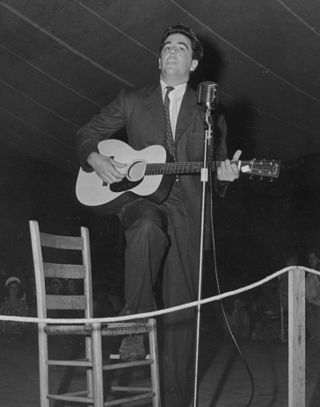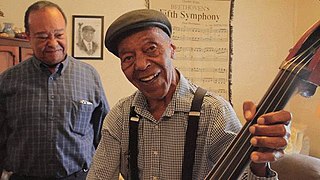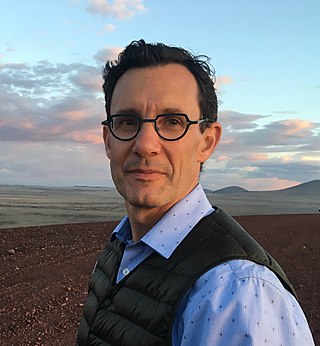
Alan Lomax was an American ethnomusicologist, best known for his numerous field recordings of folk music of the 20th century. He was a musician, folklorist, archivist, writer, scholar, political activist, oral historian, and film-maker. Lomax produced recordings, concerts, and radio shows in the US and in England, which played an important role in preserving folk music traditions in both countries, and helped start both the American and British folk revivals of the 1940s, 1950s, and early 1960s. He collected material first with his father, folklorist and collector John Lomax, and later alone and with others, Lomax recorded thousands of songs and interviews for the Archive of American Folk Song, of which he was the director, at the Library of Congress on aluminum and acetate discs.
The folklore of India encompasses the folklore of the Republic of India and the Indian subcontinent. India is an ethnically and religiously diverse country. Given this diversity, it is difficult to generalize the vast folklore of India as a unit.

Jan Harold Brunvand is an American retired folklorist, researcher, writer, public speaker, and professor emeritus of English at the University of Utah.

Michael Curb is an American musician, record company executive, motorsports car owner, philanthropist, and former politician. He is the founder and chairman of Curb Records and is the chairman of Word Entertainment. He was inducted into the West Coast Stock Car Hall of Fame in 2006. Curb is a member of the Republican Party and served as the 42nd lieutenant governor of California from 1979 to 1983. As of 2024, Curb is the most recent Republican to be elected Lieutenant Governor of California.

Folk art covers all forms of visual art made in the context of folk culture. Definitions vary, but generally the objects have practical utility of some kind, rather than being exclusively decorative. The makers of folk art are typically trained within a popular tradition, rather than in the fine art tradition of the culture. There is often overlap, or contested ground with 'naive art'. "Folk art" is not used in regard to traditional societies where ethnographic art continue to be made.

Murray Louis was an American modern dancer and choreographer.

Gloria Gaither is a Christian singer-songwriter, author, speaker, editor, and academic. She is married to Bill Gaither and together they have written more than 700 songs. In 2000, ASCAP named them Christian Songwriters of the Century. She performed, traveled and recorded with the Bill Gaither Trio from 1965 through 1991. Since 1991, she has served as a performer, recording artist, songwriter, scriptwriter and narrator for the Gaither Homecoming series of television broadcasts, video and DVD releases, and audio recordings.

Solon Spencer Beman was an American architect based in Chicago, Illinois and best known as the architect of the planned Pullman community and adjacent Pullman Company factory complex, as well as Chicago's renowned Fine Arts Building. Several of his other largest commissions, including the Pullman Office Building, Pabst Building, and Grand Central Station in Chicago, have since been demolished. Beman designed numerous Christian Science churches and influenced the design of countless more.

Richard Mercer Dorson was an American folklorist, professor, and director of the Folklore Institute at Indiana University. Dorson has been called the "father of American folklore" and "the dominant force in the study of folklore".

Simon J. Bronner is an American folklorist, ethnologist, historian, sociologist, educator, college dean, and author.
Henry Glassie College Professor Emeritus at Indiana University Bloomington, has done fieldwork on five continents and written books on the full range of folkloristic interest, from drama, song, and story to craft, art, and architecture. Three of his books -- Passing the Time in Ballymenone, The Spirit of Folk Art, and Turkish Traditional Art Today -- were named among the "Notable Books of the Year" by The New York Times. Glassie has won many awards for his work, including the Charles Homer Haskins Prize of the American Council of Learned Societies for a distinguished career of humanistic scholarship. A film on his work, directed by Pat Collins and titled Henry Glassie: Field Work, had its world premiere at the Toronto International Film Festival in 2019.
Robert Alan Cutietta is best known as an educator, author, researcher, composer, and arts leader. He is the author or co-author of five books and over fifty referereed research articles in the area of music psychology and education. He is also a composer, having written for television shows and movies.

Gertrude Prokosch Kurath (1903–1992) was an American dancer, researcher, author, and ethnomusicologist. She researched and wrote extensively on the study of dance, co-authoring several books and writing hundreds of articles. Her main areas of interest were ethnomusicology and dance ethnology, with some of her best known works being "Panorama of Dance Ethnology" in Current Anthropology (1960), the book Music and dance of the Tewa Pueblos co-written with Antonio Garcia (1970), and Iroquois Music and Dance: ceremonial arts of two Seneca Longhouses (1964), in the Smithsonian Institution Bureau of American Ethnology bulletin. She made substantial contributions to the study of Amerindian dance, and to dance theory. From 1958 to January 1972 she was dance editor for the journal Ethnomusicology.
W.K. McNeil was a prominent American folklorist, historian, record producer, and author specializing in Ozark and Appalachian mountain cultures.
Jason Baird Jackson is an American anthropologist who is Professor of Folklore and Anthropology at Indiana University Bloomington. He is "an advocate of open access issues and works for scholarly communications and scholarly publishing projects." At IUB, he has served as Chair of the Department of Folklore and Ethnomusicology and as Director of the Folklore Institute. According to the Journal of American Folklore, "Jason Baird Jackson establishes himself as one of the foremost scholars in American Indian studies today."

Mike Greene, also known as Charles Michael Greene, is an American arts executive who served as head of the National Academy of Recording Arts and Sciences (NARAS) from 1985 to 2002, and the president and CEO of Artist Tribe and myMuse.
James P. Leary is a folklorist and scholar of Scandinavian studies, and a professor at the University of Wisconsin–Madison.
Constance Bumgarner Gee is an American scholar, memoirist, animal rights activist, and advocate of the medical use of cannabis. She was the founder and director of the Arts Policy and Administration Program at Ohio State University, and later an assistant professor at Brown University and tenured associate professor at Vanderbilt University. She is the author of Higher Education: Marijuana at the Mansion, a 2012 memoir about her life as "first lady" of several American research universities. She critiques aspects of university leadership, discussing instances she perceives as inconsistencies between public image and internal practices.

Charles Burrell is an American classical and jazz bass player most prominently known for being the first African-American to be a member of a major American symphony. For this accomplishment he is often referred to as "the Jackie Robinson of Classical Music".

Steven J. Tepper is an American sociologist and the president of Hamilton College since July 1, 2024. Tepper was previously the deputy director of the Princeton University Center for Arts and Cultural Policy Studies, associate director of the Curb Center for Art, Enterprise and Public Policy at Vanderbilt University, and dean and director of the Herberger Institute for Design and the Arts at Arizona State University.












